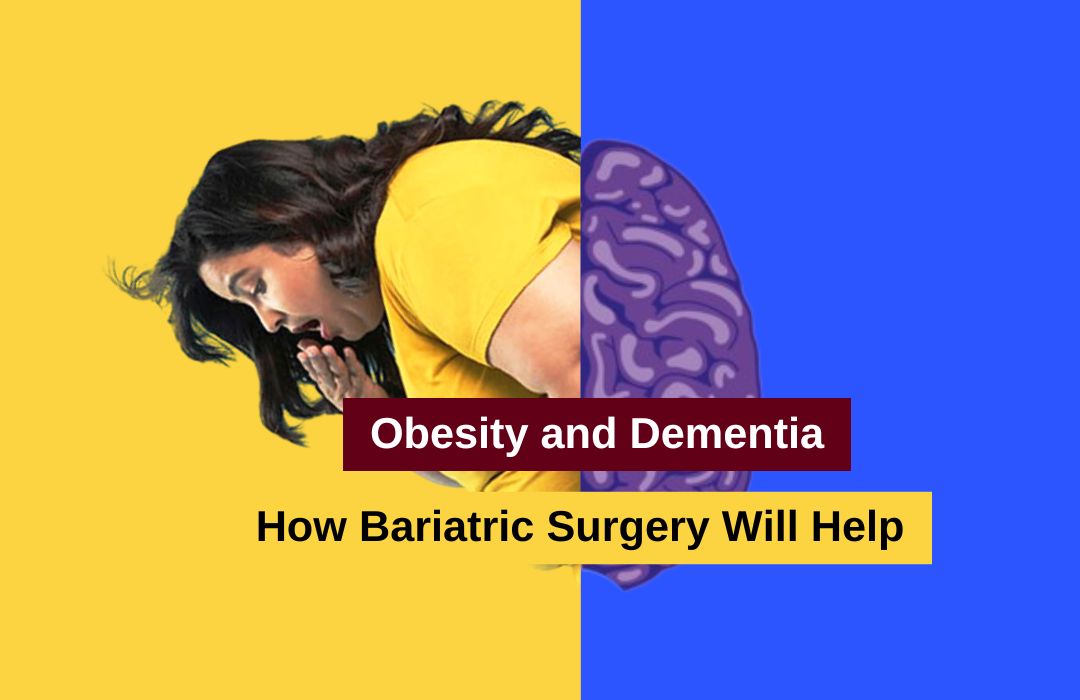
Vidhi Dave
Bariatric Dietician & Content Writer
Obesity and Dementia: How Bariatric Surgery Will Help

Obesity and dementia are two major public health issues that have received a lot of attention recently. Both circumstances have far-reaching implications for individuals as well as society as a whole. While they may appear not related at the surface, current research reveals that obesity and dementia are linked in a complicated and diverse way.
Obesity, or having too much fat on your body, is an established risk factor for dementia. However, recent study reveals that the danger level is dependent on where the fat is deposited on the body, and that it may be time to ditch the scale in favor of a tape measure.
Obesity in middle age, defined as 40 to 60 years old, has been consistently linked to an increased risk of dementia later in life. However, opinions on whether extra fat is beneficial or harmful to the cognitive function of persons over the age of 65 vary.
What does the research say?
According to fresh data from a recent population research exploring the association between obesity and cognitive performance in more than 5000 persons over the age of 60, the contradicting results can be explained by the method obesity has been evaluated in previous studies. According to this study, central obesity, or having too much abdominal fat, is the most likely cause of dementia.
The body mass index (BMI) is the most generally used measure of overall obesity, or the level of body fat. It is based on the height/weight relationship.
However, because the BMI is not a direct indicator of fat, someone with a lot of muscular mass may be mistakenly labeled as obese. Furthermore, due to changes in body composition with age, BMI is not a valid indicator of obesity in the elderly. A recent study of the population indicated that BMI was not always related with cognitive performance in older persons, although an indicator of central obesity, known as the waist-to-hip ratio (WHR), was associated with cognitive decline. This measure of central obesity has also been linked to an increased risk of developing late-onset Alzheimer’s disease and has been proven to be superior to BMI in predicting cardiovascular outcomes in the elderly.
How does waist circumference affect dementia risk?
The memory region in the brain shrinks as the belly grows bigger. Waist circumference is closely related to the size of the hippocampus, the memory-related portion of the brain. Also the terms “metabolism” and “memory” are used frequently in the same phrase because they are so closely connected. Aside from a deteriorating metabolism, inadequate nutrition, insufficient exercise, and heredity can all contribute to insulin resistance, which can progress to diabetes.
Belly fat, also known as visceral fat, can be harmful to the brain because it releases hormones and chemicals that promote inflammation and insulin resistance. As a result, extra belly fat can raise the chance of getting diabetes and has been found to be a powerful predictor of cognitive deterioration in older adults with diabetes.
Preventive methods:
Given the deep relationship between obesity and dementia, it is clear that preventive methods that treat both disorders at the same time are vital. Here are some strategies for lowering the risk of both obesity and dementia:
Diet: Eating a well-balanced, low-sugar, low-saturated-fat diet can help with weight control, inflammation reduction, and cognitive health. The Mediterranean diet, which is high in fruits and vegetables as well as healthy fats, has been linked to a decreased incidence of both illnesses.
Physical Activity: Regular exercise can help regulate body weight, improve cardiovascular health, and improve cognitive function. Physical activity is essential in the prevention of obesity and dementia.
Weight Control: Maintaining a healthy weight lowers the risk of obesity and its associated health concerns, which can minimize the chance of acquiring dementia.
Diabetes Management: If you have diabetes, you must treat it properly. To lower the risk of cognitive deterioration, blood sugar levels must be controlled and a diabetes-specific diet must be followed.
Mental Stimulation: Mentally stimulating activities like puzzles, reading, and learning new skills can help keep the brain active and may lessen the risk of dementia.
Social Engagement: It is thought that staying socially engaged and connected with others protects against dementia.
Bariatric surgery, commonly known as weight loss surgery, is gradually becoming recognized not just for its efficacy in achieving significant weight reduction, but also for its potential advantages in lowering inflammation and improving insulin sensitivity. These effects can have major ramifications for brain health and may help protect the brain from injury, especially in the setting of disorders like dementia.
Aastha Bariatrics is the center of excellence. Center of Excellence in Bariatric & Metabolic Surgery certification is awarded to a facility and its associated surgeons who have successfully completed the designation process of delivering high quality pre-operative and long term follow-up care.





